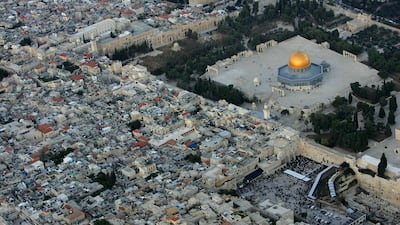John Lyons arrived in Jerusalem at the beginning of 2009 as The Australian newspaper's Middle East correspondent. He landed with "great expectations" and stayed for six years.
His posting coincided with a series of regional shockwaves and his memoir includes segments on the Arab uprisings, Iran, Syria, Lebanon, Iraq and ISIL, but really, Balcony Over Jerusalem centres on his growing and crushing understanding of "how Israel works".
The balcony of the book's title is the flat and the platform from which Lyons and his family view the "extraordinary landscape" of the Old City. Initially beguiled by his surroundings, bewilderment and disappointment soon set in.
Lyons documents with great skill the brutal architecture of the occupation and the relentless propaganda that Israel uses to coach and cajole foreign correspondents into reporting on Israel and Palestine matters from Tel Aviv's point of view. The public relations machine kicks in as soon as Lyons's appointment is confirmed. The challenge for Israel, he writes, "through its embassies and lobby groups, is how to make sure that foreign journalists do not stop the creeping annexation of the West Bank from continuing. Israel needs to portray itself as the vulnerable one". He is wined, dined and advised before he leaves Australia.
The charm offensive crumbles after Lyons begins prodding away at the occupation. While Lyons reports what he sees, pro-Israeli advocacy groups seek to discredit him, launching increasingly aggressive and personal attacks upon him. This vitriolic lobby insist that he has been manipulated by Palestinian propagandists.
__________________
Read more:
Book review: AS Patric taps into Australia’s Serbian diaspora to bring together a tale of two cities
Book review: Kamila Shamsie’s Home Fire is a contemporary take on a Greek tragedy
Book review: Seven intriguing stories about life in North Korea in The Accusation
__________________
Jonathan Cook, who contributes to this newspaper's opinion pages and who is referenced in the book, describes Lyons as "a rare breed of reporter working in Israel for a mainstream western publication. Unlike most of his colleagues, he was immune to unthinking pro-Israel sentiment, he was prepared to challenge stereotypes and media orthodoxies and he made brave decisions about the topics he covered".
Cook says Lyons refused to be silenced or sidetracked by the pro-Israeli lobby.
The injustices and the daily humiliations meted out by Israel under the smokescreen of the occupation are worth recounting. In all areas of their lives, Palestinian movement is restricted by byzantine bureaucracy, their lives monitored by an elaborate surveillance system, their human rights non-existent.
Lyons observes the demolition of a Jerusalem house belonging to an 80-year-old Palestinian woman whose family had lived in that dwelling for a century. The Israeli authorities claimed that the house had been extended illegally. In reality, the demolition was carried out as part of a broader Israeli plan to "Judaise the Old City". After the house is levelled, the woman is told she will be charged nearly $200 for each day the rubble is not cleared up.
In the West Bank, a complaint from a Jewish settler in Hebron leads the Israeli army to arrest a Palestinian boy. The child is only 5 years old, and six soldiers are sent to apprehend him. The ultimate authority over the 2.9 million Palestinians in the West Bank is the Israeli army, writes Lyons. For the 600,000 Israeli settlers, it is the civil courts.
"A lot of thought has gone into this system, which is why, after 50 years, the occupation is more entrenched than ever … the lives of Palestinians are being made difficult by a brilliantly masterminded bureaucracy," he concludes. By contrast "if you are a settler your life is free of regulations, you have the complete protection of Israel's civil law code".
Entering Gaza, Lyons finds himself walking "between one of the wealthiest nations in the Middle East and one of the most bombed places on Earth". Former British prime minister David Cameron's oft-quoted description of Gaza as an "open-air prison" is referenced in the book, a nod to it still being the most telling way to describe a territory starved, controlled and levelled by
its oppressor.
Lyons travels to Egypt, where he experiences the visceral excesses of the baying mobs in the dying days of Hosni Mubarak's decades-long rule. Sent to Cairo to cover the uprisings, he finds himself in a hotel as armed gangs loot the streets below. Lyons wonders if he will survive the night. Worse is to follow. He is detained by the security services and is driven blindfolded to a remote location. His captors eventually lose interest, distracted, perhaps, by the bigger story unfolding in the capital. Mubarak would be unseated within days.
But the central question in the book is how can Israel run a military occupation for 50 years? Lyons writes that he came to realise that Israel's position is no longer self-defence, rather "it is an entrenched system of oppression and violence".
The Israeli political elite is hooked on occupation, none more so than Benjamin Netanyahu, Israel's prime minister.
Every day it persists, the prospect of peace and a Palestinian state is sabotaged still further, especially as the aggressive settlement building programme grinds away in the background.
The author's verdict is both depressing and damning: "If the whole world could see the occupation up close," he concludes, "it would demand that it end tomorrow." For now, the Israeli public relations machine ensures the reality of the occupation remains opaque or obscured in many parts of the world, particularly in the West.


